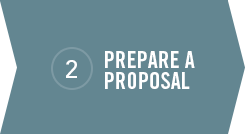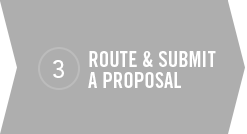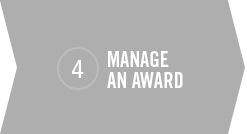 |
 |
 |
 |
Once a funding opportunity has been identified, principal investigators (PIs) prepare a proposal. Some federal agencies have specific application forms and/or their own Web-based submission systems, while other sponsors may have a less structured application process.
PIs should download the most up-to-date version of the application forms, policies, and procedures and adhere to the sponsor’s requirements.
Sponsored Programs has developed several informational documents and templates that may be useful as you are preparing a proposal:
Funding Opportunity Review Guide
- Read the entire Request for Proposal/Request for Application/Notice of Funding Opportunity and consider these questions to help determine if you'd like to move forward with preparing a proposal.
Grant Lifecycle Chart of Responsibilities
- Lists what a PI can expect from OSP as well as what OSP will expect from a PI during each phase of the proposal process.
- A good starting point if you are new to building a grant budget. Provides an overview of common budget elements and answers questions like "How do we calculate faculty salary requests? What are indirect costs? How do we determine if a cost is allowable?"
- This is a working document, so please contact OSP if you notice something on the spreadsheet that may need to be reviewed or adjusted.
- OSP requires this form to be completed prior to proposal submission. Completion of this form is important to ensure compliance and departmental approval.
- If the indirect cost rates listed do not work for your proposal and you need to use a different rate, this form must be completed prior to proposal submission.
- Current Rate = 40.00% - On Campus - All Programs (expires 06/30/2027)
- Current Rate = 8.00% - Off-Campus - All Programs (expires 06/30/2027)
The elements of a well-written and skillfully prepared research proposal will specifically address the requirements of the Request for Proposal (RFP), Program Announcement/Solicitation, or Award Opportunity.
A proposal may consist of:
- Face Page/Cover Page: The cover page captures general data elements about a proposal, such as:
- Principal Investigator's name, address, and phone number;
- Title of the proposal;
- Sponsor name and address;
- Period of performance with start and end dates;
- Amount requested;
- Institutional information; and
- Signature of Institution's Authorizing Official.
- Abstract: The abstract outlines the proposed research, including objectives, methodology, and significance of the research.
- Statement of Work or Research Plan: The statement of work or research plan should provide a full and detailed explanation of the proposed activity, typically including project goals, specific aims, methodology, and investigator responsibilities.
- Budget and Budget Justification: The budget includes a reasonable estimate of the financial support required to conduct the project, including justification of budget expenses. Typical budget categories include:
- Direct Costs;
- Indirect Costs; and
- Cost Sharing.
- Additional Information: Additional information may consist of the following:
- Current and pending support. The sponsor may require a listing of investigators and key project personnel on current awards and pending proposals.
- Letters of support from non-university investigators may also be required. If the proposal is a fellowship, a mentor support letter may be required.
- CV or Biographical Sketch: The CV or Biographical Sketch may be required for all key project personnel.
- References: A list of all references needs to be cited in the proposal.
- Used for NSF proposals submitted via Research.gov
- Access the NSF PAPPG HERE.
- Used for NSF proposals submitted via Grants.gov
- Access the Guide for the Preparation and Submission of NSF Applications via Grants.gov HERE.
